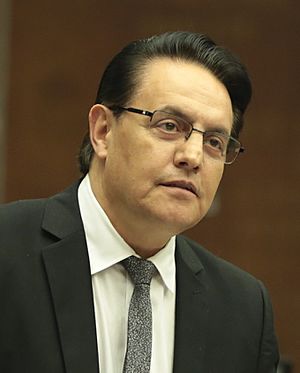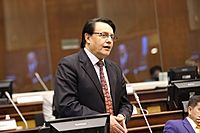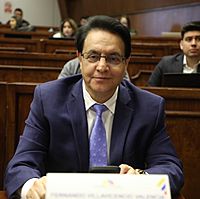Fernando Villavicencio facts for kids
Quick facts for kids
Fernando Villavicencio
|
|
|---|---|
 |
|
| Member of the National Assembly for the National Constituency |
|
| In office 14 May 2021 – 17 May 2023 |
|
| Personal details | |
| Born |
Fernando Alcibiades Villavicencio Valencia
11 October 1963 Alausí, Ecuador |
| Died | 9 August 2023 (aged 59) Quito, Ecuador |
| Cause of death | Assassination |
| Political party | Coalition Movement (2018–2021) Pachakutik (1995–2017) |
| Spouse | Verónica Sarauz |
| Children | 5 |
| Education | Cooperative University of Colombia |
Fernando Alcibiades Villavicencio Valencia (born October 11, 1963 – died August 9, 2023) was an important Ecuadorian politician, a person who worked to help workers, and a journalist. He ran to become the president of Ecuador in the 2023 election. He was a member of the National Assembly, which is like the country's parliament. He served there from 2021 until May 17, 2023, when the Assembly was closed down.
Before he became a politician, Fernando Villavicencio was a journalist who looked into important stories. He often spoke out against former President Rafael Correa. Because of his public comments, he faced legal challenges and had to live away from Ecuador for a time. He was later held for several months, but all charges against him were dropped in February 2018.
He first tried to join the National Assembly in 2017 but was not successful. However, he was elected in 2021, representing people from all over the country. In May 2023, he announced that he would run for president in the upcoming election. Sadly, Fernando Villavicencio was killed on August 9, 2023, after a campaign event in Quito.
Contents
Early Life and Education
Fernando Villavicencio was born in Alausí, a town in Ecuador. He studied journalism and communication at the Cooperative University of Colombia. He was married to Verónica Sarauz, whom he met while they both worked at the National Assembly. They had five children together.
After finishing college, he helped start the Pachakutik Party in 1995. This party focuses on the rights of indigenous people and protecting the environment. In 1996, he started working at Petroecuador, a large oil company. He first worked in communications and then became a trade unionist. A trade unionist is someone who works to protect the rights and interests of employees. He worked there until 1999, when the government fired him. With the money he received after being fired, he opened a pizza restaurant with his brother.
Journalism Career and Investigations
Villavicencio began his career as a journalist at El Universo, a newspaper in Guayaquil. During his time there, he was known for his investigative reporting. He often wrote critically about different governments, including that of Gustavo Noboa, whom he accused of not being honest. Some people questioned his work because the newspaper he worked for had a certain political viewpoint.
In 2015, Fernando Villavicencio and another person, Cynthia Viteri, shared some documents with WikiLeaks. These documents suggested that Ecuador was using a company to watch journalists and political opponents. This program was also said to be watching Julian Assange while he was in the embassy.
Political Journey
From 2013 to 2014, Villavicencio worked as an assistant for a member of the National Assembly. During this time, he and his colleague made claims about President Rafael Correa. Because of these claims, Villavicencio faced legal action and was sentenced to time in prison. He traveled to Washington, D.C., to seek help from a human rights group. When he returned to Ecuador, there was an order for his arrest. Instead of giving himself up, he stayed hidden in the Amazon region until his sentence was over.
When he first announced he would run for the National Assembly in the 2017 election, his campaign was not allowed because of his legal situation. After the legal issues were cleared, he was able to continue his campaign, but he did not win the election. After his defeat, he faced more legal problems because of his criticisms of the Correa government. He went to Peru, and while he was there, all the legal issues against him were dropped in February 2018.
Villavicencio ran for the National Assembly again in 2021. This time, he won a seat representing people from all over the country.
In May 2023, his time in the National Assembly ended. This happened when President Guillermo Lasso used a special power to close the National Assembly. Before this, some members of the Assembly had criticized Villavicencio.
Running for President in 2023
Soon after the National Assembly was closed, Fernando Villavicencio announced that he would run for president of Ecuador in the 2023 election. His campaign focused on fighting against dishonesty, reducing violence in the country, and protecting the environment.
In June 2023, he chose Andrea González, an environmental activist, to be his running mate. A running mate is the person who runs for vice president alongside the presidential candidate. On June 10, the Villavicencio-González team officially registered their candidacy. Two days later, the National Electoral Council (CNE), which manages elections, approved their candidacy. However, on June 16, his candidacy was temporarily rejected because some information was missing. This issue was quickly fixed, and his candidacy was approved again four days later.
Polls showed how popular he was. A poll on July 9 showed Villavicencio in fourth place, with about 10.23% support. A week later, on July 18, another poll showed him in second place with 13.2% support. In August 2023, his support was around 7.5%.
Assassination
On August 9, 2023, at 6:20 PM (ET), Fernando Villavicencio was killed. This happened as he was getting into a car after a campaign event at Colegio Anderson in the northern part of Quito. He was quickly taken to a nearby clinic but was pronounced dead. He was 59 years old.
After his death, Villavicencio's wife, Verónica Sarauz, said that his security team had not done enough to protect him. His running mate, Andrea González, said that a street in his hometown of Alausí would be named in his honor.
See also
 In Spanish: Fernando Villavicencio para niños
In Spanish: Fernando Villavicencio para niños



